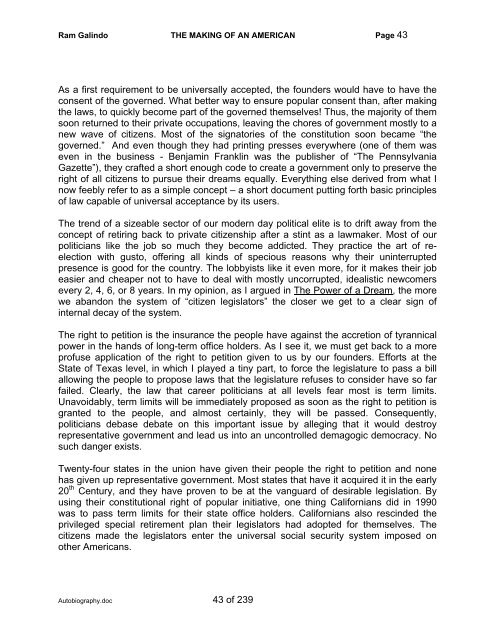Autobiography - The Galindo Group
Autobiography - The Galindo Group
Autobiography - The Galindo Group
You also want an ePaper? Increase the reach of your titles
YUMPU automatically turns print PDFs into web optimized ePapers that Google loves.
Ram <strong>Galindo</strong> THE MAKING OF AN AMERICAN Page 43<br />
As a first requirement to be universally accepted, the founders would have to have the<br />
consent of the governed. What better way to ensure popular consent than, after making<br />
the laws, to quickly become part of the governed themselves! Thus, the majority of them<br />
soon returned to their private occupations, leaving the chores of government mostly to a<br />
new wave of citizens. Most of the signatories of the constitution soon became “the<br />
governed.” And even though they had printing presses everywhere (one of them was<br />
even in the business - Benjamin Franklin was the publisher of “<strong>The</strong> Pennsylvania<br />
Gazette”), they crafted a short enough code to create a government only to preserve the<br />
right of all citizens to pursue their dreams equally. Everything else derived from what I<br />
now feebly refer to as a simple concept – a short document putting forth basic principles<br />
of law capable of universal acceptance by its users.<br />
<strong>The</strong> trend of a sizeable sector of our modern day political elite is to drift away from the<br />
concept of retiring back to private citizenship after a stint as a lawmaker. Most of our<br />
politicians like the job so much they become addicted. <strong>The</strong>y practice the art of reelection<br />
with gusto, offering all kinds of specious reasons why their uninterrupted<br />
presence is good for the country. <strong>The</strong> lobbyists like it even more, for it makes their job<br />
easier and cheaper not to have to deal with mostly uncorrupted, idealistic newcomers<br />
every 2, 4, 6, or 8 years. In my opinion, as I argued in <strong>The</strong> Power of a Dream, the more<br />
we abandon the system of “citizen legislators” the closer we get to a clear sign of<br />
internal decay of the system.<br />
<strong>The</strong> right to petition is the insurance the people have against the accretion of tyrannical<br />
power in the hands of long-term office holders. As I see it, we must get back to a more<br />
profuse application of the right to petition given to us by our founders. Efforts at the<br />
State of Texas level, in which I played a tiny part, to force the legislature to pass a bill<br />
allowing the people to propose laws that the legislature refuses to consider have so far<br />
failed. Clearly, the law that career politicians at all levels fear most is term limits.<br />
Unavoidably, term limits will be immediately proposed as soon as the right to petition is<br />
granted to the people, and almost certainly, they will be passed. Consequently,<br />
politicians debase debate on this important issue by alleging that it would destroy<br />
representative government and lead us into an uncontrolled demagogic democracy. No<br />
such danger exists.<br />
Twenty-four states in the union have given their people the right to petition and none<br />
has given up representative government. Most states that have it acquired it in the early<br />
20 th Century, and they have proven to be at the vanguard of desirable legislation. By<br />
using their constitutional right of popular initiative, one thing Californians did in 1990<br />
was to pass term limits for their state office holders. Californians also rescinded the<br />
privileged special retirement plan their legislators had adopted for themselves. <strong>The</strong><br />
citizens made the legislators enter the universal social security system imposed on<br />
other Americans.<br />
<strong>Autobiography</strong>.doc 43 of 239


